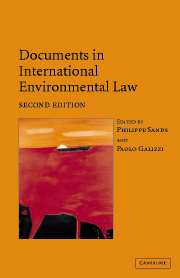Book contents
- Frontmatter
- Contents
- Preface
- PART I General instruments
- PART II Atmosphere
- PART III Oceans: global
- 8 London Convention on the Prevention of Marine Pollution by Dumping of Wastes and Other Matter, 29 December 1972
- 8A Protocol to the Convention on the Prevention of Marine Pollution by Dumping of Wastes and Other Matter, 7 November 1996
- 9 International Convention for the Prevention of Pollution from Ships, 2 November 1973
- 9A Protocol of 1978 Relating to the International Convention for the Prevention of Pollution from Ships 1973, 17 February 1978
- 10 United Nations Convention on the Law of the Sea, 10 December 1982 (extracts)
- 11 Agreement for the Implementation of the Provisions of UNCLOS Relating to the Conservation and Management of Straddling Fish Stocks and Highly Migratory Fish Stocks, 4 December 1995
- PART IIIB Oceans: regional
- PART IV Freshwater resources
- PART V Biodiversity
- PART VIA Hazardous substances and activities: nuclear
- PART VIB Hazardous substances and activities: pesticides
- PART VIC Hazardous substances and activities: waste
- PART VII Human rights and the environment
- PART VIII War and the environment
- PART IX Trade and the environment
- PART X Environmental impact assessment and access to information
- PART XI Liability for environmental damage and breaches of environmental obligations
- PART XII The Antarctic
9 - International Convention for the Prevention of Pollution from Ships, 2 November 1973
Published online by Cambridge University Press: 05 June 2012
- Frontmatter
- Contents
- Preface
- PART I General instruments
- PART II Atmosphere
- PART III Oceans: global
- 8 London Convention on the Prevention of Marine Pollution by Dumping of Wastes and Other Matter, 29 December 1972
- 8A Protocol to the Convention on the Prevention of Marine Pollution by Dumping of Wastes and Other Matter, 7 November 1996
- 9 International Convention for the Prevention of Pollution from Ships, 2 November 1973
- 9A Protocol of 1978 Relating to the International Convention for the Prevention of Pollution from Ships 1973, 17 February 1978
- 10 United Nations Convention on the Law of the Sea, 10 December 1982 (extracts)
- 11 Agreement for the Implementation of the Provisions of UNCLOS Relating to the Conservation and Management of Straddling Fish Stocks and Highly Migratory Fish Stocks, 4 December 1995
- PART IIIB Oceans: regional
- PART IV Freshwater resources
- PART V Biodiversity
- PART VIA Hazardous substances and activities: nuclear
- PART VIB Hazardous substances and activities: pesticides
- PART VIC Hazardous substances and activities: waste
- PART VII Human rights and the environment
- PART VIII War and the environment
- PART IX Trade and the environment
- PART X Environmental impact assessment and access to information
- PART XI Liability for environmental damage and breaches of environmental obligations
- PART XII The Antarctic
Summary
Editorial note
The International Convention for the Prevention of Pollution From Ships, adopted under the auspices of the IMCO (now the IMO), covers all technical aspects of pollution from ships save for waste disposal by dumping at sea. The Convention attempts to control discharges of harmful substances into the sea from vessels by establishing a certification system for ships and by requiring comprehensive enforcement of its obligations. Certificates are to be granted by each Party's national authorities in accordance with the ‘Regulations’ set out in the Convention's five Annexes, which address, respectively, oil pollution (entered into force on 2 October 1983), pollution by noxious liquid substances (entered into force on 6 April 1987), pollution by harmful substances in packaged form (entered into force on 1 July 1992), pollution by sewage from ships (entered into force on 27 September 2003), pollution by garbage from ships (entered into force on 31 December 1988). Annexes I and II are binding upon the Convention's entry into force for a Party, while Annexes III, IV, and V are binding at the option of each Party (Article 14(1)). Annex VI (not yet in force) was adopted in 1997 with the aim of preventing air pollution from ships. The Convention applies to ships flying the flag of a Party or operating within a Party's jurisdiction, but sovereign immunity applies to warships or ships in non-commercial governmental service (Article 3).
- Type
- Chapter
- Information
- Documents in International Environmental Law , pp. 275 - 288Publisher: Cambridge University PressPrint publication year: 2004



